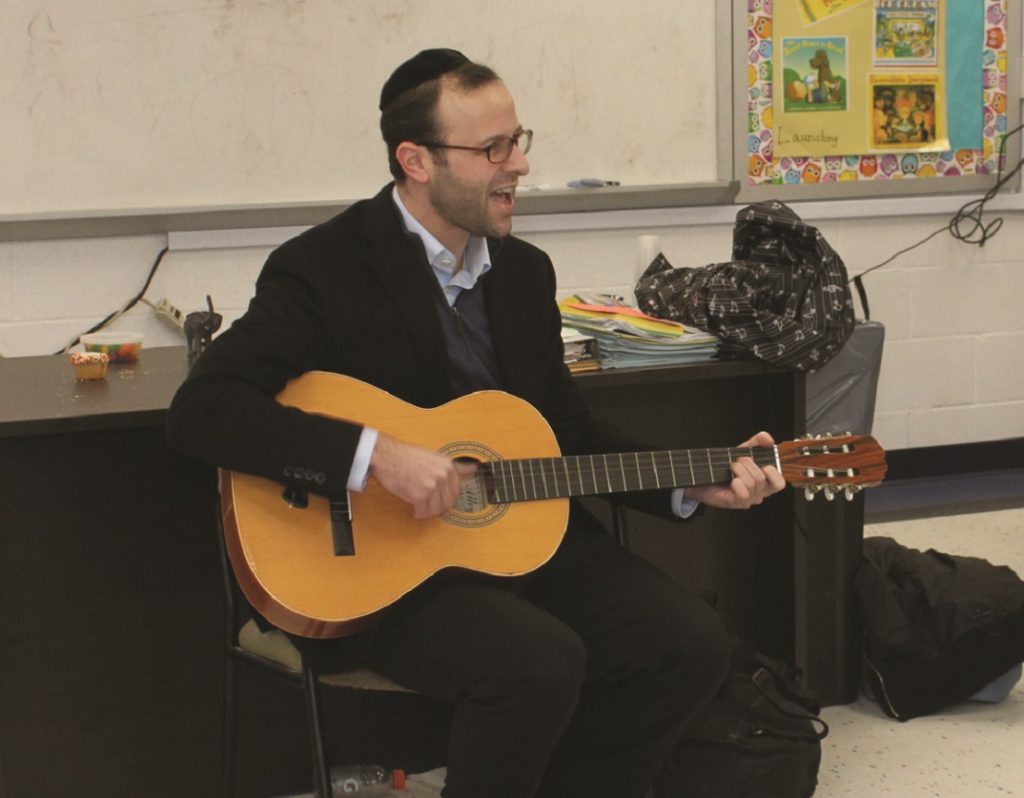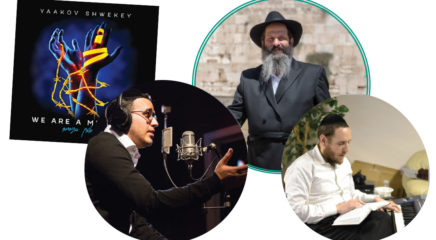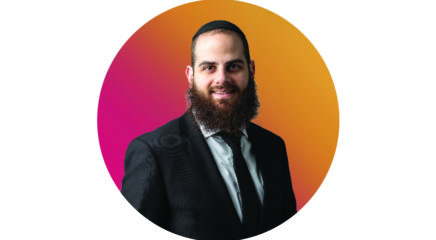S ONG: “TEFILLAT KALLAH”
ALBUM: KOLOT — YAAKOV SHWEKEY
COMPOSER: ELI SCHWAB
YEAR: 2014
Whether the chuppah overlooks the beach at Caesarea or is under the open roof of a Lakewood hall a kallah’s heart is full of hopes and dreams — and prayer. When Eli Schwab sat down to compose a song that would capture this fervent mood he had in mind the entire spectrum of couples standing under the canopy k’das Moshe v’Yisrael.
“I designed the song to have as broad an appeal as possible from American yeshivish to nonobservant Israeli ” Eli says. “My hope was that secular Israelis might also connect to a theme of kedushah and taharah at their weddings. With that in mind I ran the lyrics by an Israeli chiloni friend to check that they wouldn’t sound ‘too dati’ or ‘too chareidi’ to a secular audience. He suggested that I leave out the word ‘taharah ’ but I decided that the song might have more siyata d’Shmaya with this concept included. Baruch Hashem ‘Tefillat Kallah’ has enhanced thousands of chuppahs and is starting to be heard outside of the traditional Jewish music audience. I hope it will continue to spread and inspire.”
The uplifting chorus of “Tefillat Kallah” — “T’zakeinu l’hakim bayit ne’eman bikedushah u’vetaharah l’avodatecha v’titein ahavah v’achvah v’shalom v’reut beineinu” — has reverberated at thousands of weddings since it was recorded by Yaakov Shwekey on his Kolot album in 2014. Like the opening lyrics which speak of the blissful yet humble gratitude a kallah feels the melody begins softly with awe and humility before G-d’s kindness and then rises into the chorus a heartfelt plea for this singular eis ratzon. It asks that Hashem bless the new couple with holiness purity and the traditional blessings of love brotherhood peace and friendship between them. It was Yossi Green a mentor on Schwab’s musical journey who listened to his first version and advised him to take the chorus right from the top of the musical scale allowing the song (and prayer) to soar.
The concept of a specific tefillah for a bride is not a novel one. As far back as the 18th century seforim record various techinos and prayers for a kallah to recite on this momentous day crystallizing her thanks hopes and dreams for her new home.
Schwab sought to represent these through a popular song. “I formulated the lyrics to feel like a familiar and traditional tefillah but also simple enough to be appreciated by those less familiar with lashon kodesh ” he says.
“‘Tefillat Kallah’ has made a big mark on so many couples including those with no religious background ” says Yaakov Shwekey whose recording brought it to the public. “The lyrics — in thanks to the Master of the Universe and a request for blessing in building a bayit ne’eman — add inspiration to the holiest day of their lives which will hopefully accompany them into the future. The song is constantly requested as an introductory song to the chuppah ceremony both in America and in Israel. In fact just yesterday I spoke to a couple about a post-Sefirah wedding and of course they want “Tefillat Kallah” played first.”
Schwab — who wears another hat as a corporate real-estate attorney having graduated from Harvard Law School after years of yeshivah learning — has composed for MBD Tzvi Silberstein Beri Weber Benny Friedman Mordechai Shapiro Dovid Gabay Ohad Moskowitz Gad Elbaz Eitan Freilich Shlomo Simcha and Simcha Leiner hits like “Al Tishlach ” “Schar Mitzvah ” “Yachad ” and “Osim Teshuvah.” He says he can trace his musical gene to his renowned great-grandfather Rav Shimon Schwab who composed several niggunim and had a beautiful singing voice. Eli’s brother Meir has begun to compose too and sister Rikki is making her mark on the frum women’s music scene. As for influences on his own music like so many he singles out Abie Rotenberg and MBD for special mention and is grateful for Yossi Green’s friendship and expert input which has helped his work to shine.
“It’s an amazing feeling to have been part of the yom hachuppah prayers of so many chassanim and kallos and I hope they can internalize these words throughout their lives ” he says. (Originally featured in Mishpacha Issue 660.)





